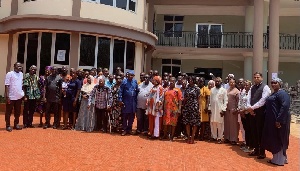- Home - News
- Elections 2024
- News Archive
- Crime & Punishment
- Politics
- Regional
- Editorial
- Health
- Ghanaians Abroad
- Tabloid
- Africa
- Religion
- Photo Archives
- Press Release
General News of Tuesday, 29 April 2025
Source: www.ghanawebbers.com
Stakeholders call for holistic support for Ghana’s rice sector transformation efforts
Key players in Ghana's rice value chain are calling for a coordinated approach. They want to strengthen the sector and address issues in production, processing, post-harvest management, and market access.
Alex Yeboah is a Rice Breeder at the Savanna Agricultural Research Institute. He stressed that achieving rice self-sufficiency requires addressing all parts of the chain.
He highlighted the need for better irrigation, mechanisation, agronomic practices, and improved seeds. Post-harvest handling must also be prioritized.
Yeboah stated, “You have to look at it holistically.” This was discussed during a workshop by CARP-GH under the ECOWAS Rice Observatory (ERO).
The event was part of the Africa Food Trade and Resilience Programme (AFT&RP). It brought together over 40 stakeholders including producers, processors, seed companies, and policymakers.
Yaw Poku is the Chairman of CARP-GH. He explained that CARP aims to transform the rice value chain for sustainability and affordability.
Ghana’s rice sector has grown significantly in recent years. However, challenges remain in aligning efforts across the value chain.
CARP-GH organized this workshop to strengthen ties among stakeholders. Poku noted that collaboration will enhance quality and market access.
The workshop showcased innovative technologies and best practices in rice production. Stakeholders discussed ways to strengthen the overall rice value chain.
Abukari Abdulai is Managing Director of Heritage Seed Company Limited. He emphasized quality assurance and adherence to seed certification standards.
He said certified seeds must be inspected by PPRSD before use. Sepenica Darko from FarmerTribe Company Limited highlighted issues with fake inputs and market access.
She noted that counterfeit products harm farmers' productivity due to poor input supply chains. Hajia Hawa Musah from the Department of Agriculture called for policy changes to boost local production.
She believes proper investment could enable Ghana to export quality rice. The workshop aligns with CARP Ghana’s 2025 work plan for structured dialogues across Northern Ghana.
So far, over 40 stakeholders have participated in learning sessions and matchmaking efforts. This strengthens collaboration across policy and business ecosystems.
The platform supports Ghana’s agricultural policies like the Feed Ghana Programme. This programme emphasizes local production and food systems resilience.
AGRA supports CARP as part of its Strategy 3.0 commitment to agricultural transformation. They aim to catalyze trade while involving youth, women, and smallholders in this agenda.
Sunil Dahiya from AGRA emphasized the importance of dialogue among rice actors. He stated this platform helps connect stakeholders for long-lasting solutions in Ghana's rice sector.
Dahiya concluded that AGRA plays a key role in unlocking opportunities within the rice sector.











